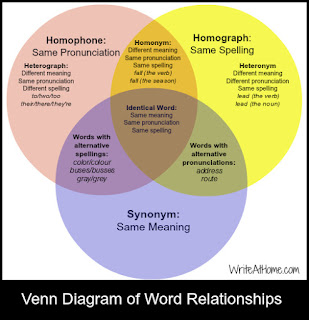Homographs

Homographs It refers to a word that is spelled the same as another word but has a different meaning. There are not many words like this, but the common ones are sometimes mispronounced, and learning the correct pronunciation will avoid misunderstandings. There is a whole class of homographs that end in -ate , usually with one being a verb and the other being a noun or an adjective related to it. For example: Advocate: 1. can be pronounced with a long "a" sound and mean "to speak or write in support of" 2. can also be pronounced with a short "a" sound and refer to a person who supports or pleads the cause of another. Some common examples are (capital letters sound stronger to each meaning): ADdress (noun – the location of a building) adDRESS (verb – to write down an address OR to speak to a grou...